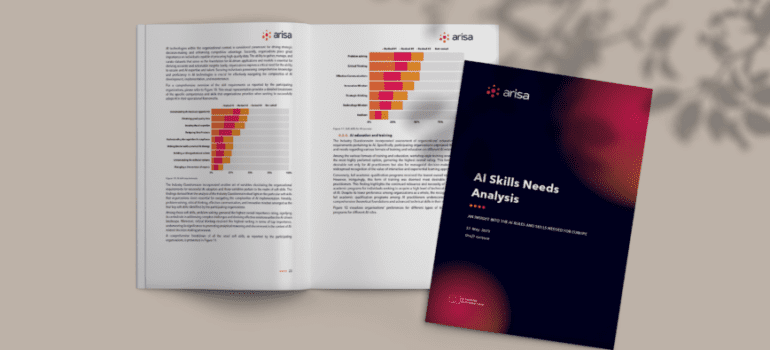TL;DR:
- ARISA project unveils comprehensive report on European AI skills gaps.
- Report addresses current and future AI skill needs.
- Focus extends beyond AI engineers to include business leaders and policymakers.
- Multi-method data collection approach informs conclusions.
- Identifies priority AI profiles with high growth potential.
- Highlights emerging roles in AI management and support.
- Policymakers seek guidance for balanced AI adoption.
- Agile, modular learning programs are essential for addressing skill gaps.
Main AI News:
In the ever-evolving landscape of artificial intelligence (AI) within the European market, the ARISA project stands as a beacon of insight. ARISA, a flagship initiative of the European Union, has recently unveiled a comprehensive report that delves deep into the critical skills gaps existing in the realm of AI. This groundbreaking report not only illuminates the current AI skills landscape but also charts a course for the future, poised to shape a new European strategy for AI upskilling and reskilling.
The AI Skills Needs Analysis, a cornerstone of ARISA’s endeavor, takes a holistic approach. It extends its purview beyond the traditional confines of AI engineers, encompassing a diverse spectrum of near-AI professionals. Among these, business leaders, technology visionaries, and policymakers find themselves under the microscope. This inclusive stance underscores ARISA’s commitment to democratizing AI, while being acutely aware of the nuanced challenges surrounding privacy, bias, and trust.
At the core of this remarkable report lies a robust methodology, incorporating multiple data collection techniques. The initial phase involved a meticulous analysis of 7,600 job vacancies, employing an AI-driven tool to decipher the prevailing AI skill demands. Moreover, the report incorporates insights garnered from over 400 industry players through survey responses, scrutinizes 240 articles, evaluates 770 learning programs, and synthesizes wisdom from 145 domain experts who participated in focus groups. These extensive inputs come from a consortium of twelve European Union countries, united in their pursuit of advancing AI through ARISA.
The crux of the analysis spotlights three priority profiles where the demand for AI professionals is anticipated to surge rapidly in the short and medium term. These high-growth areas include Machine Learning Engineers (inclusive of NLP Engineers and Computer Vision Engineers), Data Scientists, and Data Engineers.
However, the research also paints a more intricate picture:
- AI management and support roles are poised for ascension, with AI strategists, AI ethics officers, and AI quality controllers emerging as the vanguards of this transformation.
- Policymakers face the challenge of navigating the complex AI landscape, both on international and national fronts. They increasingly rely on AI advisors, individuals who straddle the realms of profound AI knowledge and policy expertise or business acumen.
- AI advisors, in turn, require a diverse skill set encompassing AI risk management, AI compliance, AI strategy formulation, and the practical implementation of AI initiatives.
- The report highlights a significant gap in the supply of learning programs that cater to emerging demands, such as prompt engineering. The call is for agile and modular programs that can swiftly adapt to the dynamic AI landscape, aligning with its ever-evolving needs.
Conclusion:
ARISA’s extensive report on AI skills gaps in Europe signifies a pivotal moment for the market. It illuminates the pressing need for a diverse range of AI skills, extending far beyond technical expertise. Policymakers, businesses, and individuals must heed the call to invest in agile learning programs and strategic AI adoption, ensuring that Europe remains competitive in the rapidly evolving landscape of artificial intelligence.

